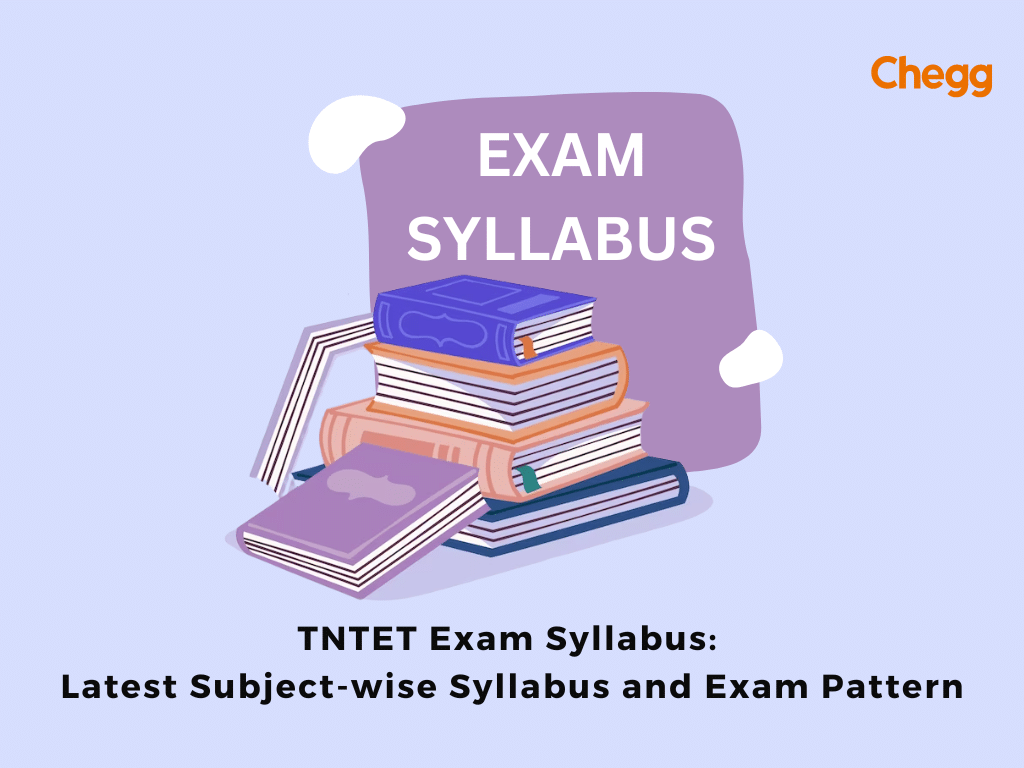TNTET Exam Syllabus 2024: Latest Subject-wise Syllabus and Exam Pattern

Table of Contents
Table of Contents
The Tamil Nadu Teachers Eligibility Test (TNTET) is conducted by the Teachers Recruitment Board (TRB), Tamil Nadu. This exam is conducted to examine the eligibility of the candidates applying for the teacher’s position at the primary and upper primary levels. Many candidates from all over Tamil Nadu appear for the exam every year. Aspiring candidates should be aware of the TNTET exam syllabus and the exam pattern, as it would help them to prepare for the exam. The exam has two papers. Paper 1 has five topics, and Paper 2 has four topics.
This article will discuss the TNTET exam syllabus in detail.

Overview of the TNTET exam syllabus
| Exam name | Tamil Nadu Teachers Eligibility Test (TNTET) |
| Exam conducting body | Teachers Recruitment Board (TRB) |
| Exam mode | Offline |
| Number Of paper | 2 |
| Number Of subjects for each paper | Paper 1 – five topics Paper 2 – four topics |
| Time duration | 2 hours and 30 minutes for each paper |
| Total Questions | 150 for each paper |
| Total marks | 150 for each paper |
| Marking system | 1 mark for correct answer and no negative marks for wrong answers |
| Paper language | Tamil & English |
| Difficulty level | Class 12 level |
| Subjects | Paper 1 English. Tamil. Mathematics. Environmental studies. Child development & pedagogy. Paper 2 English. Tamil. Maths & Science or Social studies. Child development & pedagogy. |
| Official Website | Click here |

Latest update on the TNTET exam syllabus & exam pattern
- There has been no latest announcement regarding any change in the TNTET exam syllabus.
- The candidates can prepare according to the TNTET 2022 syllabus.
TNTET exam syllabus 2024
- The TNTET exam syllabus is important to understand for aspiring candidates. This would help them to prepare the correct topics for the exam.
- The syllabus covers all the topics that would come in the TNTET exam. The candidates can prepare the topics through the prescribed books and do well in the exam.
- The candidates can prepare for the TNET exam 2024 by following the TNTET syllabus 2022.
TNTET exam syllabus for paper 1
Let’s look at the TNTET paper 1 syllabus in detail.
| Tamil | Speaking. Reading. Language Comprehension. Vocabulary. Language functions. |
| English | Speaking. Reading. Language Comprehension. Vocabulary. Language functions. |
| Maths | Number systems. Shapes & Figures. Measurements. Patterns. Study of Data. Fractional numbers. |
| Environmental studies & Science | Science (Class Ill-V) Environmental studies (Class I -Il) Social Science (Class Ill-V) History, Civics, and Geography (Class IV-V) |
| Child development & Pedagogy | Part A (Child development) Physical & Cognitive development. Social & Emotional development. Physical & Intellectual development. Social & Emotional development. Moral Development Part B (Learning) Learning Types, levels, and approaches to learning. Concepts & Constructs. Factors contributing to leaming. Constructivist approach to learning. Learning & Knowledge. |
- The candidates can prepare a timetable to cover all the TNTET paper 1 syllabus topics.
- There are a number of prescribed books for the subjects to cover all the topics with proper exercises to revise the topics.
- The prescribed books would help to cover the topics present in the paper. This would help to prepare well for the exam.
- The candidates must practice several mock papers and solve the previous year’s papers to prepare for the TNTET Paper 1 exam.
TNTET exam syllabus for paper 2
Let’s look at the TNTET syllabus 2022 paper 2 in detail.
| Tamil | Speaking. Reading. Language Comprehension. Vocabulary Language functions. |
| English | Speaking. Reading. Language Comprehension. Vocabulary Language functions. |
| Child development & pedagogy | Nature of Educational pedagogy. Human Growth & Development. Cognitive development. Social, emotional, and moral development Learning. Intelligence & creativity. Motivation & group dynamics. Personality & assessment. Mental health & hygiene. Guidance & counselling. |
| Social Science | History. Civics. Geography. Economics. |
| Maths | Class VI Measurements. Number systems. Life mathematics. Algebra. Data handling. Geometry. Practical geometry. Class VII-VIII Real number system. Measurements. Life mathematics. Practical geometry. Geometry. Data handling. |
| Science | Health & hygiene. World of animals. Applied biology Life process. Environmental science Matter & measurements. Exploring the world. Forces & movement. Exploring chemical changes and their formulation. Exploring phenomena. |
- The TNTET paper 2 has four subjects. The subjects are
- Tamil.
- English.
- Child development & pedagogy.
- Mathematics & Science or Social Science.
- The candidates must prepare a timetable to cover all the topics of the subjects of paper 2. This would help them to cover all the topics uniformly and on time.
- The candidates should also practice several mock papers and solve the previous year’s papers to prepare well for the exam.
TNTET exam pattern 2024
TNTET exam pattern for paper 1
Let’s look at the TNTET exam pattern for paper 1 in detail.
| Subjects | Questions | Marks | Time |
| Tamil | 30 | 30 | 2 hours and 30 minutes |
| English | 30 | 30 | |
| Child Development & Pedagogy. | 30 | 30 | |
| Mathematics | 30 | 30 | |
| Environmental Studies | 30 | 30 | |
| Total | 150 | 150 |
TNTET exam pattern for paper 2
Here is the exam pattern for TNTET paper 2:
| Subjects | Questions | Marks | Time |
| Tamil | 30 | 30 | 2 hours and 30 minutes |
| English | 30 | 30 | |
| Child Development & Pedagogy | 30 | 30 | |
| Mathematics & Science OR Social Science | 60 | 60 | |
| Total | 150 | 150 |
- The TNTET exam for papers 1 & 2 is offline and objective-based. The candidates have to mark their answers on the OMR sheet provided.
- 1 mark is awarded for the right answer. No marks are deducted for wrong answers.
- All questions are compulsory, and the candidates can start from any section.
- The language papers would check the language proficiencies of the candidates.
- The child development and pedagogy papers aim to analyze the candidates’ understanding of child psychology and learning ability.
- Maths, Social Science, Science, and environmental studies analyze the candidate’s understanding of the concepts, problem-solving skills, and knowledge of the subject.
Also Read: TNTET Previous Year Question Paper: Download Subject-wise PDFs of Paper 1 & Paper 2
Candidates can download the latest detailed syllabus for the TNTET 2024 exam below
| Paper 1 | Click to Download |
| Paper 2 | Click to Download |
Competitive books for TNTET exam 2024
Let’s look at the list of books to help you prepare for the TNTET exam.
| Paper 1 | |
| Child Development & Pedagogy. | Child Development and Pedagogy by Kiran Publications. |
| Tamil | TN board Tamil language books. |
| English | English Language by Geeta Sahni. Pearson Publications |
| Maths | Quantitative Aptitude by RS Aggarwal. S Chand publications. |
| Environmental studies | Environmental studies by Wiley publications. |
| Paper 2 | |
| Tamil | TN board Tamil language books. |
| English | English Language by Geeta Sahni. Pearson Publications. |
| Child Development & Pedagogy. | Child Development and Pedagogy by Kiran Publications. |
| Maths | Quantitative Aptitude by RS Aggarwal. S Chand publications. |
| Science | NCERT books for Science. |
| Social Science | Social Science by Disha publications. |
- There are many books related to the subjects for the TNTET exam. It is not possible to cover all the books. So, choosing the right book would help to cover all the topics, understand the topics, and revise properly before the exam.
- All the topics of the TNTET exam syllabus are important. So, covering all the topics properly and practising them before the exams is advised.
Conclusion
The TNTET exam syllabus is important to know how to prepare for the exam. With the syllabus knowledge, the candidates can prepare the right topics for the exam. The candidates can prepare a timetable according to the topics. This would help them complete the syllabus on time and invest their time in practicing mock papers.
All the topics are important. Candidates cannot ignore a single topic to clear the exam with good marks. The candidates require the right books to prepare for the exam. The TNTET exam is competitive as several candidates appear for the exam for limited seats. So, understanding and preparing for the syllabus is important.
Also read, Different Teacher Exams in India 2024
Frequently Asked Questions (FAQ’s)
What should I study for the TNTET exam?
You should study for the TNTET exam to get recruited as a teacher in Tamil Nadu state schools for primary and upper primary levels.
What is the passing mark for the TNTET exam?
The passing marks for general candidates are 90 (60%) and 82.5 (55%) for reserved categories.
Which book is best for the TNTET exam?
The best books to prepare for the TNTET 2022 syllabus are:
1. Child Development and Pedagogy by Kiran Publications
2. English Language by Geeta Sahni- Pearson Publications
3. Quantitative Aptitude by RS Aggarwal- S Chand publications
4. Social Science by Disha publications
5. Environmental studies by Wiley publications
6. TN board Tamil language books
7. NCERT books for Science
What are paper 1 and paper 2 in TNTET?
Paper 1 has five subjects. They are Maths, Environmental Studies, English, Tamil, Child Development, and Pedagogy. Paper 2 has four subjects. They are Child Development and Pedagogy, Maths & Science or Social Science, English and Tamil.
Is clearing TNTET easy?
The difficulty level is moderate. The questions are based on the Class 12 syllabus. But the competition is high. So, the candidates have to score high to get selected.
Is TNTET easy?
It is moderately hard. The candidates must have strong knowledge of the Class 12 syllabus to clear the exam.